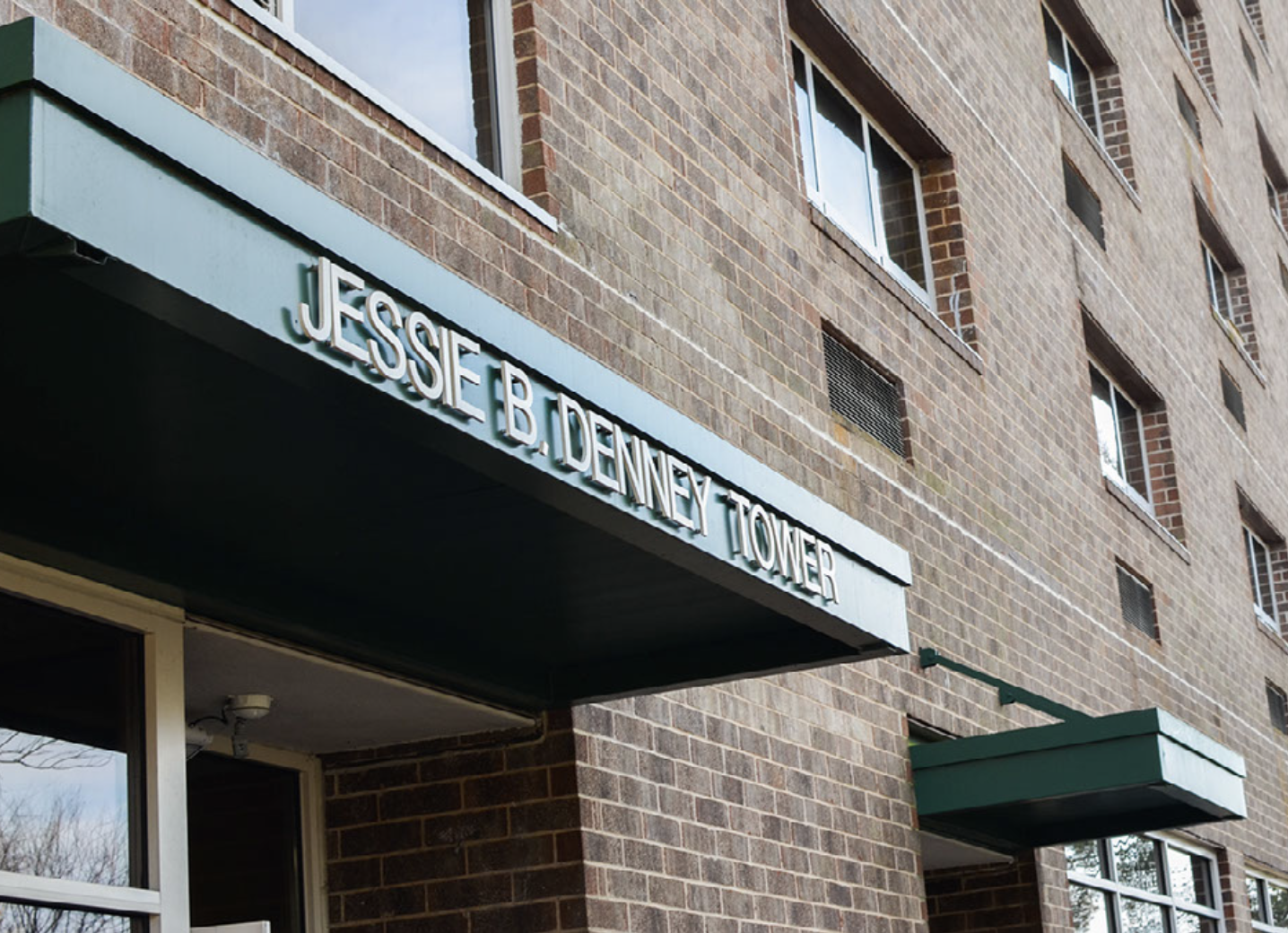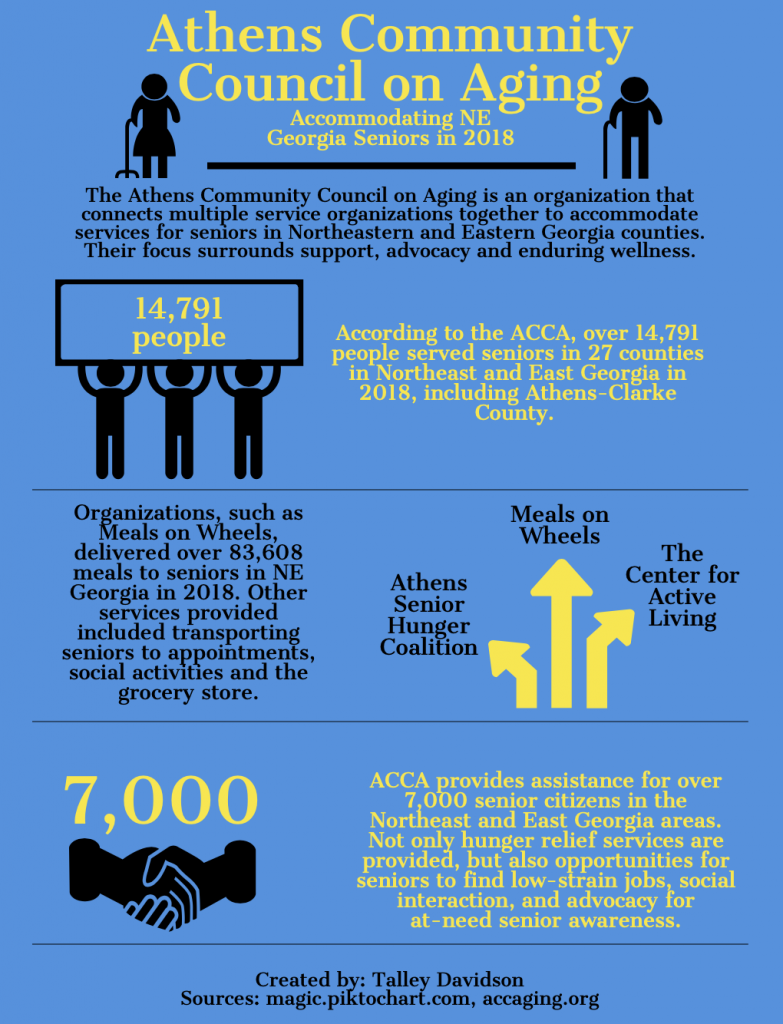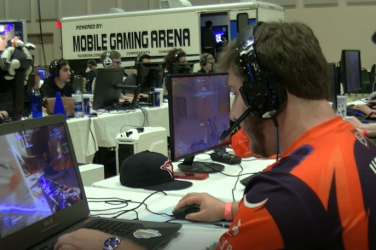Arlene Stern imitates the life of a University of Georgia college freshman. She has hallmates. She loves roaming downtown by the Georgia Theatre. She had a different life before settling in Athens. Yet, Arlene is not a student. She does not live in a dorm. She avoids downtown past dinnertime. And before coming to Athens, she was not living at home with her parents.
She was homeless.
Jessie B. Denney Tower, a senior citizen public housing residency, run by Athens Housing Association, sits humbly along Dougherty Street on the edge of downtown Athens. It is home to over 140 at-need residents of various backgrounds, standing 10 stories high. “I live on the 10th floor facing downtown. It’s almost like Christmas every day. I can see the bars, restaurants and the lights,” says Stern.
While I listened to 63-year-old resident Arlene Stern describe the joy she finds in having her unit in Denney Tower face the skyline of downtown Athens, life before Denney Tower for her was not so magical. “I was born in Brooklyn, New York in 1956. I was put into an infant’s home at one-and-a-half-years-old. The state took my sister and I from our mother. My parents were Holocaust survivors, and so they weren’t mentally or emotionally really very stable, especially my mom.”
From that age on, Stern lived an almost nomadic life.
Many seniors find that the most affordable options for them during retirement is public housing. Watch below to find out about senior life in public housing and the stereotypes behind it all.
All On Her Own
She endured foster care until age 21, dealt with an abusive foster brother and had to waitress her way through college. However, at age 40, her trials didn’t stop. As I sat with Arlene in the quiet, stuffy craft room of Denney Tower, I waited for her to address the elephant in the room. “When I hit my 40s, I got real sick,” she explains.
In 2012, Stern lost her leg to Peripheral Vascular Disease, a disease that involves the gradual weakening and hardening of the arteries. “In 1996, my sister was already living out here in Georgia. She married somebody that was born and raised in Atlanta. She’s a registered nurse and she got me out here. Basically I’ve been here ever since.”
Similar to that of other Denney Tower seniors, Arlene’s health issues and lifetime of having a service career lead her to lean on public housing for support. After living with her sister for years, Stern explained that they mutually decided public housing would help her feel less isolated and better cared for since her sister worked while Stern was left at home.
But that transition did not occur without a plight of homelessness.
There’s No Place and No Home
“In between the years with my sister and the five years I’ve lived here, I was semi-homeless because my sister put me up in a motel for two or three weeks,” says Stern. “Then, I stayed with a resident for about another two to three weeks until I got the letter.”
The letter.
Stepping back into the shoes of a college freshman, Denney Tower public housing is such a need for seniors in the community that there is a waiting list—just like receiving an admission letter to your college of choice.
She finally received an available unit with a magical 10th floor view and hallmates that would bring her fellowship. Yet, while seniors like Stern have found security and hope in government housing like Denney Tower, the surrounding community is not always so quick to perceive public housing in a positive light.
The Realities of Public Housing
Recently retired Athens Housing Authority Communications Director Marilyn Appleby explains the stereotypes surrounding public housing in the Athens community: “The negative thing about living in public housing is that the rest of the community doesn’t realize how public housing helps people. There’s a tendency to hear negative comments about where they live. Although we may not have the most amenities, were striving to have a safe environment for our residents. The rental expense is something they can afford.”
According to the 2019 Athens Housing Authority demographic report, 77 percent of Denney Tower residents have to rely on their social security to pay their rent. Even so, some residents still work. “Rent is 30 percent of their income. Even if their income goes up slightly, their rent will not. Their rent is extremely stable,” continues Appleby.
With the stable rent, seniors are given further financial assistance by the elimination of additional utility charges- no gas, no water no electric. The only additional charge is their cell phone bills.
Yet, while it may appear that the residents are receiving significant financial help, some still struggle with balancing their finances month to month. In 2018 the United Health Foundation revealed that the average senior food insecurity rate in northeast Georgia was 18.1 percent. “My food stamps don’t help me at all,” says Stern. “ I mean, I got $15 last month, but they split it. So I got $7.50 at the beginning of the month, and $7.50 at the end. But sometimes, we help each other out here. That’s another great thing about this building.”
The Invisible Problem
Food Bank of Northeast Georgia Grant Manager, Mark Bailey, addresses the challenges of providing funding for senior food insecurity in the area: “Senior hunger is actually very difficult to fundraise for. A lot of donors are really interested in giving to kids because a child in need is a story that pulls the heartstrings,” he explains. “But senior hunger is a much more invisible problem because seniors are hidden at home. So that need doesn’t get as much attention because there’s just not as much knowledge about it.”
One organization, Athens Community Council on Aging, has committed their time, energy and resources to helping seniors in Athens who are food insecure and immobile.
Bailey believes many Athens community members don’t realize that the overall food insecurity rate in northeast Georgia is 13.6 percent, according to Feeding America in 2018. Furthermore, the food insecurity in Athens-Clarke County is 21.6 percent. “The number one thing people don’t realize is that the idea of people being hungry is not some far distant idea. It’s right here in our community, in our neighbors’ homes,” says Bailey.
Mark Bailey was born and raised in Athens and decided to invest in a career at the food bank to combat the abnormally high poverty rate in Athens-Clarke County of 34 percent (12.7 percent worse than the national poverty line of 12.3 percent according to the US Census Bureau) and the widespread case of food insecurity facing families, children and seniors alike.
Seventy-four-year-old Mike Copas, a neighbor to Stern in the Denney Tower community, knows first hand what it is like to be food insecure. “I do get food from the food bank every other month. They bring a bag of groceries to my door and I go through and keep some and some I give away. It helps me save money that way,” says Copas.
Copas, born and raised in Cleveland Ohio, faced a long road of trials before settling in Denney Tower, likewise to Stern. He joined the Navy as a teenager, visited the South while he served, and returned once he was out on his own again. He worked a service job in a bike shop—Bicycle South—in Decatur, Georgia for several years. Meanwhile, he was living above the garage of his doctor’s office.
But it wasn’t long until one neglected house fire left him homeless.
A Past Burned to Ashes
“I thought it was my arthritis waking me up that night. When I got up and around to the bathroom, I saw that the living room was on fire. And I got out of there.”
Now 74-year-old self proclaimed hippie, Copas has found a home in Athens, and more specifically, Denney Tower. “I like to get involved and volunteer at AthFest,” he says as he points to his tie dye AthFest t-shirt, now giving way to holes after years of wear. Copas is known as a social guy around Denney Tower, in addition to his community involvement. After he receives his monthly brown bag of food from the food bank, he takes the food he doesn’t find a need for and shares it with the rest of the building.
However, while some seniors like Arlene Stern and Mike Copas enjoy communal living and getting involved in the the college town, not all seniors escape isolation. Living in a secluded unit away from immediate family resorts some residents to extreme loneliness. “A lot of people don’t come out of their rooms at all to do anything with anybody,” says Stern.
Feeling unrecognized and forgotten is unfortunately a common issue in places like Denney Tower. “I think many times older adults just get forgotten about,” confesses Appleby. “They become invisible in our communities, but especially in a community like Athens that is very vibrant and has a lot of young adults. We tend to focus on the younger people.”
However, while some fellow community members of Athens-Clarke County may be unaware of the the at-need seniors in their midst, several students at the University of Georgia do contribute to helping seniors both socially and with their food insecurity.
Hidden, Not Forgotten
“You guys are so fun,” says Stern as she smiles at me from her chair. “Here, we love helping the students out with their projects.”
Often times students from UGA, such as students from the school of social work, greek organizations and more, will help put on programs for entertaining the residents to help them feel known and recognized by the younger community. This past February, graduate students in the school of social work put on a Valentine’s Day program for the seniors and organized activities like bingo and holiday themed crafts.
Additionally, students invest their time in combating community hunger. “The students are massive supporters of us,” says Bailey. “We have the UGA Food 2 Kids program, and there are student volunteers who come out and pack hundreds of Food 2 Kids bags in an hour every week. It’s incredible.”
However, while it is reassuring to know there are resources for at-need community members such as affordable housing at Denney Tower and the food distributions sourced by the Food Bank of Northeast Georgia, it can be hard to put oneself in the shoes of someone who has faced hunger and homelessness.
“We never know what sorts of things are going to occur to us in our lives,” says Appleby.
How Life Unfolds
Now, looking back on the life journeys of Stern and Copas, she’s completely correct.
No one chooses to have emotionally scarred parents too traumatized from a genocide to care for them. No one chooses to have a physically crippling disease. No one chooses to rely on $15 monthly food stamps. No one plans for homelessness thanks to a simple house fire.
No one knows how their life will unfold.
But in those cases of homelessness, hunger and health troubles, Athens seniors can find shelter and food alongside their hall-mates for the time being, clinging to the safety of a loaded brown bag, mesmerized by the downtown skyline from their 10th-story window.
Talley Davidson is a journalism major in Grady College of Journalism and Mass Communication.









